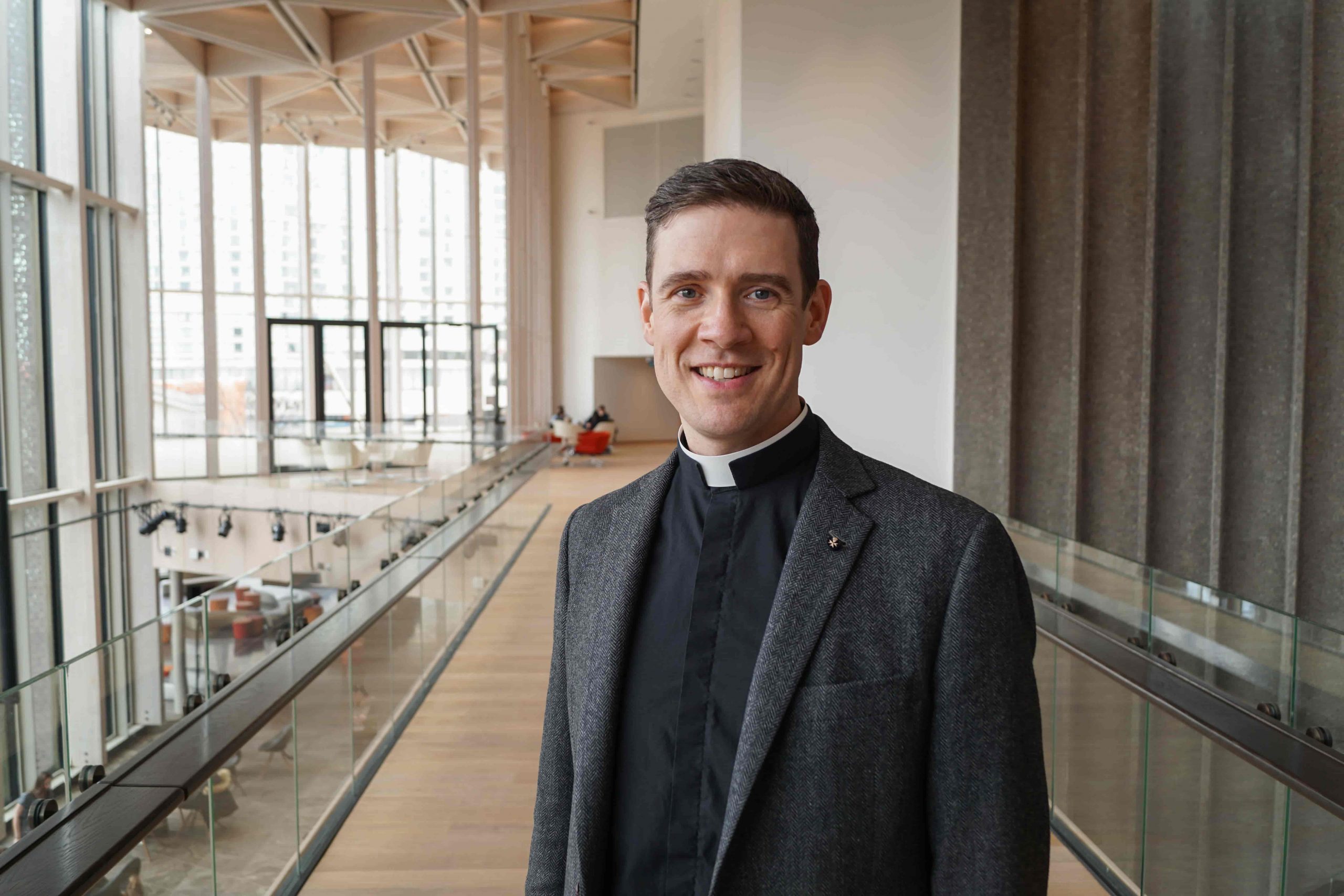Dr. Albert Cheng joins Cardus Education to provide insight and direction for education research. FOR IMMEDIATE RELEASE April 23, 2019HAMILTON, ON – Cardus is pleased to announce that Dr. Albert Cheng has joined Cardus Education as a senior fellow. Dr. Cheng’s work with Cardus comes as he continues to work as an assistant professor at the Department of Education Reform at the University of Arkansas. “Dr. Cheng is an accomplished professor with expertise in areas such as education policy and independent schools,” said Ray Pennings, Executive Vice President of Cardus. “His knowledge and interests align very closely to ours, so it’s exciting to have him join our roster of senior fellows.” Dr. Cheng says he’s looking forward to his new cooperation with Cardus. “I’m excited to be taking on this new role with Cardus – an organization whose work I know well and for which I have immense respect,” said Dr. Cheng. “The Cardus Education Survey and other Cardus research in education has helped to uncover and document the valuable contributions that independent and faith-based schools make to the common good.” Dr. Cheng has a PhD in education policy. He teaches courses on the history and philosophy of education as well as education policy analysis at the University of Arkansas. Known for his research on character formation, school choice policy, faith-based schooling, and homeschooling, he serves on the editorial board for the International Journal of Christianity and Education. He is also a research affiliate with Charassein: The Character Assessment Initiative at the University of Arkansas and the Program on Education Policy and Governance at Harvard University. Dr. Cheng has a master's degree in education from Biola University. He worked as a high school math teacher in the San Francisco Bay Area after completing a mathematics degree from the University of California, Berkeley. -30- MEDIA INQUIRIES Daniel Proussalidis Cardus - Director of Communications 613-241-4500 x508 dproussalidis@cardus.ca

University of Arkansas Professor Appointed Cardus Senior Fellow
April 22, 2019

Two Niagara-Area Educators Win Prestigious Teaching Awards
FOR IMMEDIATE RELEASE April 17, 2019 HAMILTON, ON – Niagara-area teachers Laurie Blue and Brenda Boks have won a 2019 John Rozema Teaching Excellence Award. Blue won in the Humanities and Fine Arts category, while Boks takes home the award in the Special Education category. Blue teaches at Niagara Christian Collegiate in Fort Erie. Known for rigorous classes where students’ first work is never accepted as their final work, Blue also teaches students that art is not just a personal expression; it can also change societies and cultures. Boks is Director of Student Support Services at Beacon Christian School in St. Catharines. She led efforts to turn Beacon into a model of inclusiveness for students with special needs. The school now excels at providing physical access to students with mobility challenges, accessing health supports for students, and delivering additional literacy and numeracy support. “Laurie Blue’s work in the classroom and out of it exemplifies what a teacher’s commitment to art looks like,” says Ray Pennings, Executive Vice President of think tank Cardus. “Brenda Boks efforts remind us that independent Christian schools have an enviable vision of inclusiveness for all.” Also winning Rozema Awards this year are:Harry Blyleven at Hamilton District Christian High School in the STEM Teaching category Rachael Weening at Toronto District Christian High School in the Global Perspective categoryRozema Award winners will be honoured at the 2019 Edvance Christian Schools Association conference on October 24. -30- MEDIA INQUIRIES Daniel Proussalidis Cardus - Director of Communications 613-241-4500 x508 dproussalidis@cardus.ca About the Award The John Rozema Teaching Excellence Award recognises excellence as an ongoing investment into the life of a Christian school community and a positive public contribution to the common good. Open to all independent Christian schools in Ontario, the award is presented in partnership with the Christian School Foundation and EduDeo Ministries.
April 17, 2019

York Region Teacher Wins Award for Global Perspective Teaching
FOR IMMEDIATE RELEASE April 17, 2019 HAMILTON, ON – A high school teacher at a school in Vaughan, ON is being recognised for her work in leading students through a special cultural immersion program in the Dominican Republic. Rachael Weening will receive a John Rozema Teaching Excellence Award in the Global Perspective category. Under Weening’s guidance, students attending Toronto District Christian High School participated in a semester-long program that included eight weeks in the Dominican Republic. During their time there, the Canadian students learned Spanish, took English and Philosophy courses, and worked to serve others through manual labour, teaching, and as personal support workers at an orphanage. “Rachael Weening has truly expanded the perspectives of her students, making them more culturally aware and more sensitive to others’ needs,” says Ray Pennings, Executive Vice President of think tank Cardus. “This is another example of an independent Christian school contributing to the common good.” As part of the award, Weening will receive $5,000 to help fund her personal professional development as a teacher. Also winning Rozema Awards this year are:Laurie Blue at Niagara Christian Collegiate in the Humanities and Fine Arts category Harry Blyleven at Hamilton District Christian High School in the STEM Teaching category Brenda Boks at Beacon Christian School in the Special Education categoryRozema Award winners will be honoured at the 2019 Edvance Christian Schools Association conference on October 24. -30- MEDIA INQUIRIES Daniel Proussalidis Cardus - Director of Communications 613-241-4500 x508 dproussalidis@cardus.ca About the Award The John Rozema Teaching Excellence Award recognises excellence as an ongoing investment into the life of a Christian school community and a positive public contribution to the common good. Open to all independent Christian schools in Ontario, the award is presented in partnership with the Christian School Foundation and EduDeo Ministries.
April 17, 2019

Hamilton Teacher Wins Award for STEM Teaching
FOR IMMEDIATE RELEASEApril 17, 2019 HAMILTON, ON – Local high school teacher Harry Blyleven is being recognised for his work in teaching Science Technology Engineering and Math (STEM) to students in Grades 9 to 12. Blyleven will receive a John Rozema Teaching Excellence Award in the STEM category worth $5,000 to help fund his professional development as a teacher. Under Blyleven’s guidance, students at Hamilton District Christian High School created a smartphone app that allows Westfield Heritage Village visitors to enjoy a narrated walking tour of the museum. The project stretched students’ abilities in computer programming, audio engineering, graphic design, and communication. “Harry Blyleven worked with students at four grade levels to encourage them to test their boundaries and excel in their studies,” says Ray Pennings, Executive Vice President of think tank Cardus. “His teaching is a reminder that independent Christian schools are often at the forefront of STEM teaching.” Also winning Rozema Awards this year are:Laurie Blue at Niagara Christian Collegiate in the Humanities and Fine Arts category Brenda Boks at Beacon Christian School in the Special Education category Rachael Weening at Toronto District Christian High School in the Global Perspective categoryRozema Award winners will be honoured at the 2019 Edvance Christian Schools Association conference on October 24. -30- MEDIA INQUIRIES Daniel Proussalidis Cardus - Director of Communications 613-241-4500 x508 dproussalidis@cardus.ca About the Award The John Rozema Teaching Excellence Award recognises excellence as an ongoing investment into the life of a Christian school community and a positive public contribution to the common good. Open to all independent Christian schools in Ontario, the award is presented in partnership with the Christian School Foundation and EduDeo Ministries.
April 17, 2019

New Child Care Rebates a Step in the Right Direction
FOR IMMEDIATE RELEASE April 11, 2019 The new child care tax rebates announced as part of the Ontario government’s latest budget are a step forward in making child care generally more affordable, says think tank Cardus. The new rebates promise up to $6,000 for the lowest income Ontario families, though they could go a high as $8,250 for families with a child that has a severe disability. “Child care is a major expense for many families, so a refundable tax rebate should help to ease that burden,” says Peter Jon Mitchell, Acting Program Director of Family at Cardus. “And these rebates are largely in line with one of the key recommendations in our recently released policy paper, A Positive Vision for Child Care, which calls for funding to follow the child, not daycare spaces.” The new rebates will also be available for a wide variety of types of care. “Child care is the care of a child, no matter who does it,” says Mitchell. “Rebates that are child-based, not centre-based, provide families with flexibility to choose the kind of care that works for them.” However, Mitchell worries that some families that need help might still fall through the cracks. “If parents can’t afford to pay for child care at all, a tax rebate won’t help,” says Mitchell. “However, the promised system of advanced child care payments for low income families – which is still years away – might help.” The new rebates also don’t cover all types of child care. “If parents choose not to use a paid child care provider, the rebate doesn’t recognize the value of their choice,” says Mitchell. Cardus has recommended that provinces introducing child care tax rebates broaden the definition of what constitutes child care to include all forms of care, including parental, family, home-based, nannies, or independent care. Access the full list of provincial recommendations in A Positive Vision for Child Care online. -30- MEDIA INQUIRIES Daniel Proussalidis Cardus - Director of Communications 613-241-4500 x508 dproussalidis@cardus.ca
April 11, 2019

Can Education Help End America’s Culture War?
FOR IMMEDIATE RELEASE April 4, 2019 As Americans tire of toxic political rhetoric and a decades long culture war, have state and national leaders tapped into education’s full potential? A new paper from think tank Cardus suggests leaders need to take a broader view of schooling in order to take full advantage of what education can offer. “Non-government, and especially religious, schools are often considered damaging to social cohesion,” write authors Marisa Casagrande and Ray Pennings in Religious Schools: Seedbeds of Civic Virtue in the Culture War? “This report challenges that assumption. Relying on outcome-based data from several surveys of adults who graduated from religious schools … we argue that the value of religious schools for creating civic virtue has been underappreciated.” The paper references the Cardus Education Survey of 2014, a representative sample of 1,500 American high school graduates between the ages of 24 and 39. Among its findings, it shows that attending an independent or religious school is associated with a long-term positive influence on civic measures and outcomes. Graduates of religious schools especially stand out in terms of giving and volunteering – two pro-social behaviours standing in contrast to today’s often bitter public discourse. Graduates from Protestant schools are much more likely to go on a social service trip and to donate money or goods to an important cause or organization. Catholic school grads are the most consistently positive on giving and volunteering, showing a higher likelihood of volunteering outside their congregation and donating to charity. In other pro-social behaviours, such as political interest, trust in organizations, and an obligation to participate in civic affairs, religious independent school graduates largely match the levels of engagement of public school graduates. In brief, state and national leaders could find allies for pluralism and civility by taking a more welcoming view toward independent religious schools. “At their best, religious schools and other religious spaces can offer valuable communities of practice where particular dispositions of tolerance, humility, and patience can be formed,” write Casagrande and Pennings. Recent Barna Research data collected in partnership with Cardus show that American church leaders, parents, and schools also aren’t speaking to one another enough on these matters either. More than half of non-mainline Protestant (56%) and four in 10 Catholic clergy say they haven’t addressed the topic of school choice even once in the last year. In both cases, fewer than half of church leaders say parents even asked about it. “Church leaders, parents, and educators are missing the opportunity to bring religious schools into the conversation about building a unified, pluralistic American society,” says Pennings. “If political leaders also recognized the value of these schools, it would help tame America’s culture war.” Download Religious Schools: Seedbeds of Civic Virtue in the Culture War? from the Cardus website. -30- MEDIA INQUIRIES Daniel Proussalidis Cardus - Director of Communications 613-241-4500 x508 dproussalidis@cardus.ca
April 4, 2019

Fair, Open, Competitive Contract Bidding for All Municipalities
FOR IMMEDIATE RELEASE April 2, 2019 HAMILTON – With Bill 66 passing third reading in the Ontario legislature, municipalities in the province stand to gain hundreds of millions of dollars by opening public construction contracts to all qualified bidders. The bill updated Ontario’s outdated labour laws, which had blocked almost $2.5 billion worth of publicly funded municipal infrastructure work from fair and open competition. Until now, Toronto, Hamilton, Waterloo Region, and Sault Ste. Marie – along with the Toronto District School Board – limited bids on public construction projects only to firms affiliated with a handful of favoured unions. Research has established that governments without fair and open bidding are paying inflated and uncompetitive prices for construction projects. Fair and open bidding on these construction contracts would save taxpayers a conservatively estimated $370 million. “This change has been a long time in coming,” said Brian Dijkema, Work & Economics Program Director at think tank Cardus. “Finally, municipal governments, school boards, and other entities no longer have to be captive to a small group of trade union interests. Better yet, all qualified contractors will be able to have the opportunity to contribute to the construction of the communities where they live and play.” The move to update Ontario’s labour laws is also in line with advice recently heard at the Economic Club of Canada. To book an interview with Brian Dijkema, please, contact Daniel Proussalidis. MEDIA INQUIRIES Daniel Proussalidis Cardus - Director of Communications 613-241-4500 x508 dproussalidis@cardus.ca
April 2, 2019

Ontario Special Education Funding is Discriminatory and Unjust
FOR IMMEDIATE RELEASE March 21, 2019 OTTAWA – Ontario’s Special Education Grants deny up to 34,500 of the province’s most vulnerable students the learning support they need. In its new report, Funding Fairness for Students in Ontario with Special Education Needs, think tank Cardus finds provincial education funding to accommodate children with special needs is unfairly allocated based on the type of school the student attends rather than on the need of the child. This means Ontario’s $3 billion in Special Education Grants are available only to students in government-run schools. Students who attend independent schools receive zero support. “Under the current arrangements, if a student with special needs transfers from a public school to an independent school, they are not permitted to transfer any equipment and services which had been provided, regardless of individualized custom fitting or design,” according to Funding Fairness. “Without even discussing the waste involved in this, this is discrimination based on school choice which disregards the needs of the child.” Ray Pennings, report co-author and Cardus executive vice-president, says the system must change. “It is indefensible that in this modern era, we still discriminate against students living with a disability,” says Ray Pennings, Cardus executive vice-president and report co-author. “Services for students living with a disability should be based on need and not on the school the child attends.” Funding Fairness recommends Ontario provide equitable funding for students with special needs in independent schools by supplying their schools with up to 75 percent of the level of support government-run schools get in this area. With an estimated maximum of 34,500 students receiving help, this would cost the provincial treasury about $195 million. “Providing equitable access to equipment and services to all students living with a disability is a matter of basic fairness that will enable all Ontario children to learn, thrive, and succeed,” says report co-author and Cardus senior fellow Dr. Deani Van Pelt. “Adjusting Ontario’s outdated policy will help the province achieve greater inclusion and equity.” Funding Fairness for Students in Ontario with Special Education Needs is available online. MEDIA INQUIRIES Daniel Proussalidis Cardus - Director of Communications 613-241-4500 x508 dproussalidis@cardus.ca
March 21, 2019

Survey Reveals Communication Breakdown Among Church Leaders, Parents, Schools
FOR IMMEDIATE RELEASE March 19, 2019 OTTAWA – A newly released survey of clergy in the United States points to the need for new conversations and partnerships among churches, parents, and schools to address spiritual formation in Generation Z. The Barna Group, in partnership with think tank Cardus, conducted the survey of 650 clergy in Mainline Protestant, Non-mainline Protestant, and Catholic churches. The survey captured church leaders’ perceptions of education and spiritual formation. Key findings include:65% of Protestant pastors and 50% of Catholic priests perceive schooling generally to be a negative influence on a child’s spiritual formation. More than half of non-mainline Protestant (56%) and four in 10 Catholic clergy say they haven’t addressed the topic of school choice even once in the last year. In both cases, fewer than half of church leaders say parents even asked about it. Only 20% of Protestant clergy and 17% of Catholic clergy reported prioritizing training for parents for the spiritual formation of their children. An analysis of Cardus Education Survey U.S. data finds a measurable and positive influence that Christian schooling has on spiritual formation. The data clearly demonstrate that graduates of Christian schools are more likely to pray, read the Bible and attend church regularly, and tithe than their public school counterparts are. This school effect is distinct from the influence of family, socio-economic background, or church life. “Church and family life are important in the spiritual formation of young adults, but our research reinforces that schools play an important role too,” says Ray Pennings, Cardus executive vice-president. “Church leaders, parents, and educators must understand the positive influence of Christian schooling on spiritual formation and work together to ensure that these schooling options are genuinely available for as many families as possible.” The Barna findings and a commentary on the numbers by Ray Pennings are both available online. MEDIA INQUIRIES Daniel Proussalidis Cardus - Director of Communications 613-241-4500 x508 dproussalidis@cardus.ca
March 19, 2019



